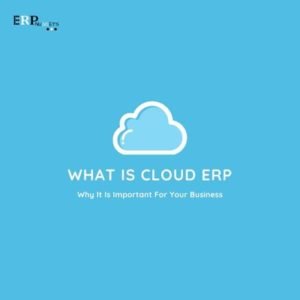What Is Cloud ERP And Why It Is Important For Your Business?

If you’re like most business owners, you’re always looking for ways to improve your company’s efficiency and bottom line. That’s why you may be wondering what cloud ERP is and how it can benefit your business.
Cloud ERP is a type of enterprise resource planning (ERP) software that is delivered via the cloud. This means that instead of being installed on your company’s servers, it is hosted by the ERP provider.
There are many benefits of using cloud ERP, including the fact that it is more affordable than traditional ERP software, it is easier to implement, and it doesn’t require the same level of IT support.
In addition, cloud ERP can help you improve your company’s communication and collaboration, as well as its ability to scale.
If you’re looking for ways to improve your business, cloud ERP is definitely worth considering.
Cloud ERP software can be deployed in a private, public, or hybrid cloud environment. Cloud ERP systems are typically subscription-based, with users paying a monthly or annual fee to access the software. Cloud ERP systems can offer a number of benefits over on-premise ERP systems, including reduced IT costs, increased flexibility, and scalability.
What Are The Benefits Of Cloud ERP?
Cloud ERP systems offer a number of benefits for businesses. They can be deployed quickly and easily, without the need for extensive hardware or software infrastructure. They are also highly scalable, so businesses can easily add users and functionality as needed. Additionally, cloud ERP systems offer a high degree of flexibility, so businesses can tailor the software to their specific needs. Finally, cloud ERP systems are typically more affordable than on-premise ERP systems, making them a good option for small and medium-sized businesses.
What Is The Difference Between Cloud And On-Premise ERP?
There are benefits to both cloud and on-premise ERP systems. Cloud ERP systems are typically more affordable and easier to implement than on-premise ERP systems. On-premise ERP systems offer more control and customization options. The main difference between the two is that cloud ERP systems are hosted on the vendor’s servers, while on-premise ERP systems are hosted on the company’s own servers.
talk about What are the benefits of cloud based ERP solutions vs on premise ERP software
There are many benefits of cloud based ERP solutions vs on premise ERP software. One major benefit is the lower cost of ownership for cloud based solutions. This is because there is no need to purchase and maintain hardware and software, which can be very expensive. Additionally, cloud based solutions are typically much easier to implement and use, which can save a lot of time and money. Another benefit is that cloud based solutions can be accessed from anywhere, which is convenient for employees who travel or work remotely. Finally, cloud based solutions are typically more scalable than on premise solutions, so they can grow with your business.
Is Cloud ERP A SaaS?
Cloud ERP is a type of enterprise resource planning software that is delivered via the cloud, instead of being installed on premises. This means that it can be accessed from any device with an internet connection, and is often more affordable and easier to set up than on-premises ERP software. Cloud ERP can also be more scalable, since it can be easily expanded or reduced as needed.
How Flexible Is Cloud ERP?
In today’s business world, the cloud is becoming increasingly popular for a number of reasons. One of the biggest reasons is because it’s so flexible. With cloud ERP, businesses can scale up or down as needed, without having to worry about the infrastructure. Additionally, cloud ERP is often more cost-effective than traditional on-premise ERP solutions.
What Are The Best Cloud ERP Systems For Small Businesses?
There are many cloud ERP systems available for small businesses. Some of the best cloud ERP systems include Microsoft Dynamics 365 Business Central, Oracle NetSuite ERP, and SAP Business ByDesign. These systems offer a variety of features and benefits that can help small businesses streamline their operations and improve their bottom line. When choosing a cloud ERP system for your small business, it is important to consider your specific business needs and budget.
What Is Your Biggest Problem With A Cloud-Based ERP
The biggest problem with a cloud-based ERP is the lack of control that businesses have over their data. With a cloud-based ERP, businesses are reliant on the security and availability of the service provider. If the service provider experiences an outage or a security breach, businesses can lose access to their data and applications.
What Are The Issues In Implementing Cloud Based ERP?
There are a few issues to consider when implementing a cloud-based ERP system. One is data security and compliance. You need to make sure that your data is safe and compliant with any relevant regulations. Another issue is integration with existing systems. You need to make sure that your cloud-based ERP system can integrate with your existing systems and data. Finally, you need to consider cost. You need to make sure that you can afford the subscription fees.
In Summary
Cloud ERP is as close to ideal as a software system can get. By providing benefits like easy scalability and quicker implementation, Cloud ERP can help your business achieve more. Cloud ERP can integrate all aspects of your business, from finance and sales to inventory and project management.
